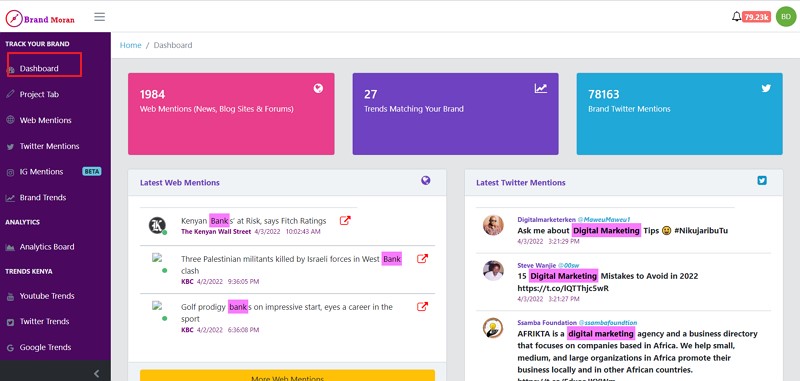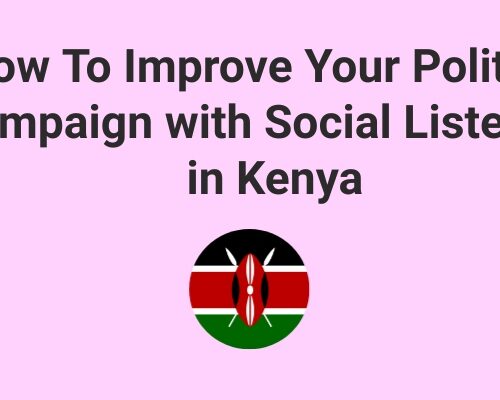Social Listening Kenya, Social Media Monitoring
How Kenyan Government Agencies Can Use Social Listening to Improve Public Engagement



Public engagement in Kenya has undergone a fundamental shift thanks to the digital era. Citizens no longer wait for town hall meetings or traditional avenues to voice their opinions. These days, many will tweet about poor service delivery. Some will post on Facebook about infrastructure problems, while others share videos on TikTok documenting their experiences with government agencies. You will also find citizens discussing policies in public groups and debating government performance on platforms like Reddit.
Yet most Kenyan government agencies remain disconnected from these conversations. Unfortunately, some end up discovering problems through traditional media, formal complaints, or citizen surveys days or weeks after issues have already shaped public opinion. In a digital-first society, this reactionary approach undermines agencies’ credibility, constituent trust, and opportunities to enhance service delivery.
That’s where social listening comes in.
What Is Social Listening?
Social listening goes beyond simply tracking mentions or comments on social media. It’s all about analyzing online conversations to understand trends, sentiments, and perceptions around government services, programs, and policies.
While social media monitoring in Kenya tells agencies what is being said, social listening explains why people are saying it and how public institutions can respond or improve. It’s a powerful tool that can help government organizations make data-driven decisions and communicate more effectively.
Why Social Listening Matters for Kenyan Government Agencies
Now that you understand what social listening is, let’s delve into 6 reasons why social listening for government agencies is a now pretty much a must.
1. Early Detection of Crises and Public Safety Issues
Just like any other country, Kenya faces real challenges: infrastructure problems, healthcare delivery gaps, security concerns, environmental issues, and political tensions. Social media is often where Kenyans first report emergencies like that flooded road, a disease outbreak, a fire, an accident.
This is why agencies that monitor social conversations can detect crises within minutes, not hours. For instance, a water utility company using a social listening tool to monitor Twitter might discover a major leak before residents have filed support tickets or called in for support.
The Ministry of Tourism might notice a spike in discussions from travelers about poor experiences at heritage sites. This kind of real-time feedback can help an agency identify specific service issues, engage directly with visitors, and work with county tourism boards to improve visitor satisfaction.
This speed of detection isn’t just about protecting reputation; it can save lives as the government coordinates rapid response.
2. Understanding Constituent Feedback and Service Gaps
From time to time, we have seen Kenyan citizens having varying opinions about government services. Some will complain about long queues at government offices, slow processing of applications, inconsistent service quality, and lack of transparency.
The problem is that traditional feedback mechanisms like surveys, focus groups, and suggestion boxes capture only a fraction of this sentiment. Social listening, on the other hand, captures authentic, unfiltered feedback from thousands of citizens in their own words.
A county government, for example, might discover through social media monitoring that residents might want extended office hours, or that a specific service is more in demand than expected. A utility company might learn that its complaint resolution process is confusing. A health facility might identify which services need improvement.
This kind of intelligence drives targeted improvements that actually address citizen needs rather than guessing what constituents want.
3. Managing Misinformation and Building Trust
We are at a time where misinformation spreads rapidly on Kenyan social media, particularly during elections, crises like public health crises, or political debates and the likes. The problem is that such false claims about government programs, health warnings, or policy changes can undermine public trust and create confusion.
Without tailored social and media monitoring tools, the relevant government agencies can’t respond to misinformation in real-time. In fact, by the time official correction comes through traditional media, false claims have already shaped public opinion.
Well, social listening enables government agencies in Kenya to:
- Detect misinformation as it spreads
- Respond quickly with accurate, factual information
- Track how corrections spread and their effectiveness
- Build credibility through transparent, timely communication
If misinformation spreads that a major highway project has stalled or been cancelled, an agency like the Ministry of Roads can detect these claims early, publish progress updates with photos or videos, and engage directly with concerned citizens to maintain trust.
4. Competitive Intelligence and Benchmarking
With social listening, you will stay on top of what other counties or government agencies are doing. Kenyan counties and government agencies indirectly compete with each other. Citizens tend compare experiences across regions or rather, social media reveals how services are perceived across different counties and similar agencies.
Social listening thus allows government leaders to:
- Identify what other counties or agencies are doing well
- Benchmark their performance against peers
- Learn from peer agencies’ successes and failures
- Identify best practices worth adopting
This competitive benchmarking drives continuous improvement and better services to stakeholders.
5. Building Community Engagement and Trust
Citizens expect the government to be responsive and accessible. Again, social media provides a direct channel for two-way communication, but only if the government is actively listening and responding.
Agencies that monitor and respond to social conversations build relationships with constituents. They demonstrate that they care about citizen feedback, that they’re transparent about challenges and solutions, and that they’re committed to improvement.
Such responsiveness builds public trust, a precious resource for government legitimacy and effectiveness.
For instance, the Ministry of ICT and Digital Economy could listen to discussions around youth empowerment and digital jobs. They can be able to spot concerns or success stories shared online and use this to tailor mentorship programs. They can communicate new funding opportunities, making citizens feel heard and included.
6. Reputation Management in a Connected Society
A government agency’s reputation is shaped by what citizens say about it on social media. Remember that negative experiences will spread quickly. After all, positive work goes unnoticed unless actively communicated.
Social listening tools in Kenya allow agencies to:
- Monitor their reputation in real-time
- Address negative sentiment before it becomes entrenched
- Highlight positive work and citizen testimonials
- Respond to criticism with accurate information
- Build a narrative of improvement and responsiveness
This kind of strong reputation does translate to public support in terms of aspects like funding, policies, and initiatives.
The Cost of Not Listening
Government agencies that ignore social listening face real costs:
- Loss of Trust: Citizens feel unheard and unimportant. Citizens might perceive the government as indifferent and inefficient, even when reality is different.
- Missed Opportunities: Citizen feedback and best practices go unnoticed. Such agencies continue operating based on assumptions rather than actual constituent needs.
- Crisis Mismanagement: Government discovers emergencies through news media rather than direct constituent reports. This means that response is delayed, coordination is poor, and public panic increases.
- Misinformation and Confusion: Citizens are exposed to conflicting information from official and unofficial sources. Such public confusion undermines policy implementation.
- Reputational Damage: Critics become louder. Public approval erodes. Political support weakens.
For a government sector focused on improving service delivery and earning citizen trust, the cost of not listening is substantial.
The Solution: Brand Moran’s Social Listening Platform
The beauty is that implementing social listening doesn’t require massive investment or complex technology. Brand Moran is a social listening and media monitoring platform specifically designed for organizations operating in Kenya and across Africa.
Brand Moran enables Kenyan government agencies to:
- Monitor All Conversations in One Place: Track what citizens are saying about your agency, services, policies, and jurisdiction across Twitter, Facebook, Instagram, Google Reviews, news outlets (TV, Radio, print media), and local blogs all aggregated in one dashboard.
- Detect Problems Early: Real-time alerts notify you instantly when your brand is trending, when negative sentiment spikes, or when crisis indicators emerge. Respond before problems escalate.
- Understand Sentiment: Sentiment analysis categorizes mentions as positive, negative, or neutral, revealing how constituents actually feel about your agency and services. Track sentiment trends over time.
- Customize Alerts: Get SMS alerts when your agency is trending on volatile platforms like Twitter (X). Customize alerts to match your priorities and communication channels.
- Competitive Intelligence: Monitor similar agencies and peer counties to benchmark performance and identify best practices.
- Generate Actionable Reports: Analyze conversation patterns, top issues, sentiment trends, and constituent concerns. Transform insights into specific service improvements.
- Affordable and Accessible: Designed for government budgets and the African market. There are no complex technical requirements-it is easy to use, plus we offer quick responsive support.

How to Start Social Listening as a Government Agency
For Kenyan government agencies considering social listening, the path forward is clear:
- Define objectives: What do you want to achieve? Crisis detection? Service improvement? Reputation management? Constituent engagement?
- Choose the right platform: Brand Moran offers government-friendly pricing, local support, and features specifically valuable for African government agencies.
- Start monitoring: Identify key channels where your constituents are active. Monitor what they’re saying about your agency and services.
- Train your team: Equip staff to interpret data, respond appropriately, and act on insights.
- Measure impact: Track sentiment trends, response effectiveness, and business outcomes.
Conclusion
In a nutshell, social listening isn’t surveillance or control. It’s genuine engagement. It’s the government saying to citizens: “We’re listening. We care about your feedback. We’re committed to improving based on what we hear from you.”In Kenya’s digital-first society, this message is essential. After all the people expect the government to listen. They expect responsive communication. They expect their feedback to drive improvement. The question isn’t whether the Kenyan government should implement social listening. The question is: how quickly can the government begin genuinely listening to the citizens it serves?
Ready to start listening? Brand Moran helps Kenyan government agencies monitor their reputation, understand constituent feedback, and respond faster to crises. Schedule a free consultation with our team to see how social listening can transform your agency’s engagement with citizens.
Book a demo with us or contact us at info@brandmoran.com to learn more.




